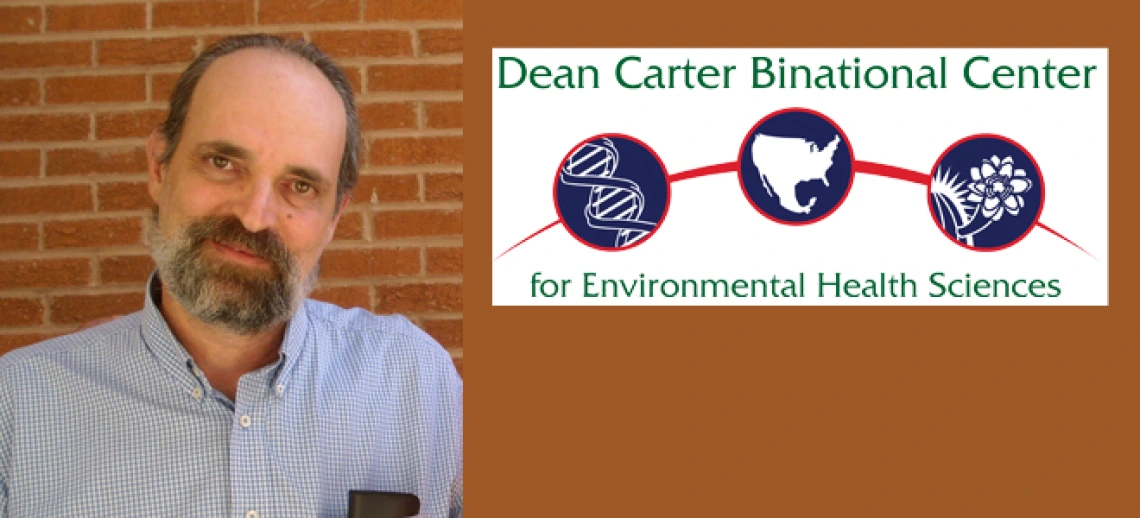Field New Director of the Dean Carter Binational Center

 The University of Arizona Superfund Research Program (UA SRP) Dean Carter Binational Center for Environmental Health Sciences was the “brainchild” of Dr. Dean Carter, the first Director of the UA SRP. Carter began fostering cross-border ties in the 1990s. When he retired, Drs. A. Jay Gandolfi and James Field applied a shared interest in cross-border environmental research to bring this brainchild to fruition. The pair pursued funding from Mexico’s Science and Education Ministry (CONACyT) and US Agency for International Development (USAID), and established a Memorandum of Understanding (MOU) with CONACyT to support the international exchange of graduate students and implementation of binational training workshops. In 2005, a federal earmark formally established the Dean Carter Binational Center with Gandolfi as the Director. After officially retiring in 2012, Gandolfi has now handed the baton over to Field to continue the successful work of the Binational Center. New Director Field affirms his commitment to continuing this important work: “The long-term goal of the Binational Center is to empower stakeholders on both sides of the border to be partners in finding solutions to help resolve the environmental health issues they are confronting.”
The University of Arizona Superfund Research Program (UA SRP) Dean Carter Binational Center for Environmental Health Sciences was the “brainchild” of Dr. Dean Carter, the first Director of the UA SRP. Carter began fostering cross-border ties in the 1990s. When he retired, Drs. A. Jay Gandolfi and James Field applied a shared interest in cross-border environmental research to bring this brainchild to fruition. The pair pursued funding from Mexico’s Science and Education Ministry (CONACyT) and US Agency for International Development (USAID), and established a Memorandum of Understanding (MOU) with CONACyT to support the international exchange of graduate students and implementation of binational training workshops. In 2005, a federal earmark formally established the Dean Carter Binational Center with Gandolfi as the Director. After officially retiring in 2012, Gandolfi has now handed the baton over to Field to continue the successful work of the Binational Center. New Director Field affirms his commitment to continuing this important work: “The long-term goal of the Binational Center is to empower stakeholders on both sides of the border to be partners in finding solutions to help resolve the environmental health issues they are confronting.”
Discussions with Mexican partners have led to wide agreement to realign the Binational Center to focus globally on improving environmentally-sustainable mining approaches that will minimize impacts on health, resources, and local ecosystems. In collaboration with UA SRP Director Dr. Raina Maier and UA Lowell Institute for Mineral Resources Director Dr. Mary Poulton, Field recently received an NIH- R13 grant funded by NIEHS for a September, 2014 international conference in San Luis Potosi, Mexico entitled, “Environmentally- and Socially-Responsible Mining for the Protection of Vulnerable Populations and Surrounding Environment in Latin America.” The attendees will include government officials, non-governmental organizations, and community and industry leaders. The output will be the creation of a network of professionals that will lead the development of a regional “Mining Hub.” Over the next several years, this Mining Hub will foster the development of environmentally- and socially-responsible mining methods through collaborative research, training of interdisciplinary professionals, and outreach to vulnerable communities that go beyond the US.
Former Director Gandolfi summarizes the key accomplishments of the Binational Center: “we have demonstrated the value of nation-to-nation interactions in addressing common environmental concerns, the power of collaboration, and the absolute importance in educating our future professionals and surrounding populace. We have proven that education and environmental pollution know no boundaries."

